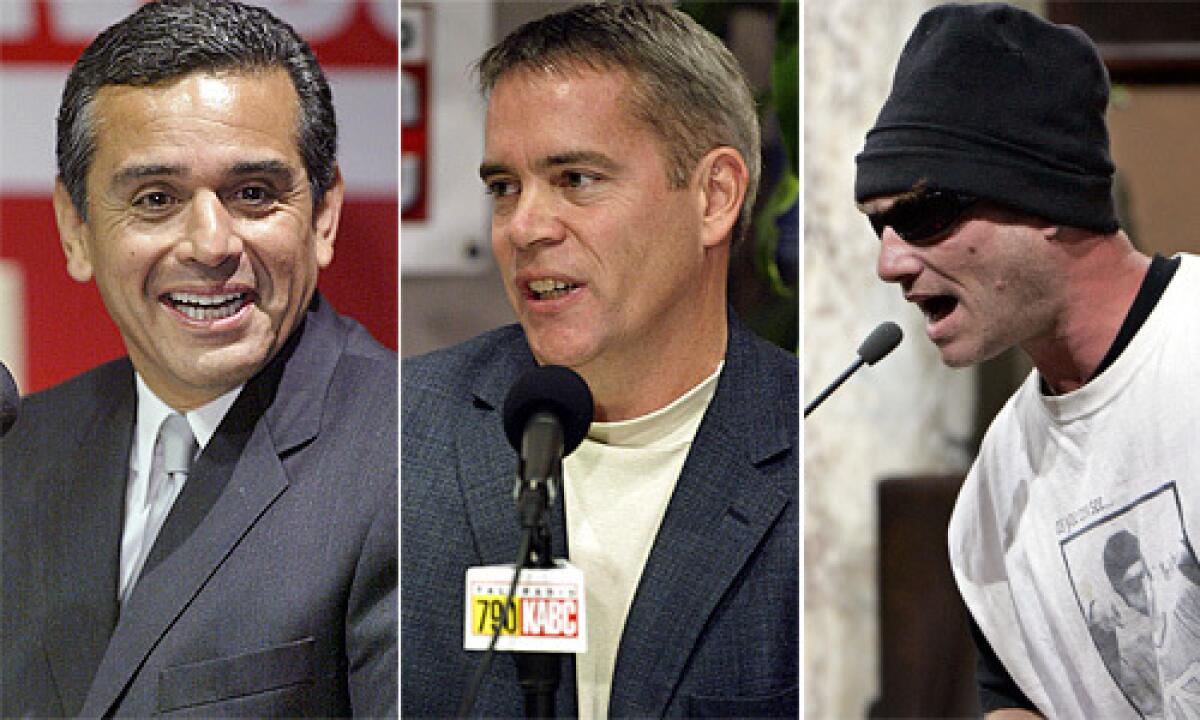Solar energy: Q & A with L.A. mayoral candidates

- Share via
Should the City of Los Angeles become a national leader in the generation of renewable solar energy, as a March 3 ballot measure proposes?
Or would it be too costly to put 400 megawatts’ worth of photovoltaic cells on roofs and parking lots across town?
Times editors recently asked the 10 mayoral candidates about the solar energy charter amendment, Measure B. Here are excerpts of their responses.
Do you support Measure B, the city’s proposed solar power initiative? Why? How do you believe it will affect Department of Water and Power rates?
Carlos Alvarez:“Our city is choking on traffic and smog. Increasing the use of solar power is central to this. But Measure B takes the unfortunate step of forcing working taxpayers to pay for it, in part, through a bond. A bond measure is like a flat tax, which treats the super-rich and the poor as if they are somehow equal. Because of this, I do not support it.
“As mayor, I would vastly expand the use of solar power and renewable energy sources to promote a clean and safe environment. This should be funded by steep taxes and penalties placed on polluting corporations doing business in L.A. that are destroying our environment.”
James Harris:“My campaign does not support Measure B.”
David R. Hernandez: “The idea of solar energy is exciting and is already being demonstrated to be worthwhile. LAUSD as well as the Community College District have and are in the process of installing solar panels at their facilities. All without Measure B. Notwithstanding the process in which it reached the ballot, I am opposed to it, as it creates a serious and risk laden charter amendment change giving the City Council and mayor a dubious power over future rate increase abilities. The lack of open bidding on installation creates a serious financial challenge to the residents of Los Angeles.”
Phil Jennerjahn: “Absolutely not. Measure B is almost organized crime by the mayor and the IBEW [International Brotherhood of Electrical Workers, the union for Department of Water and Power employees who would install the solar panels]. The issuing of a $3.6-billion solar energy contract with no open bidding or free market competition is certain to skyrocket the eventual cost. Measure B is a huge payoff to the IBEW for their votes.”
Walter Moore:“I oppose Measure B. . . . It is little more than a vague plan to come up with a plan. Measure B, moreover, would unjustifiably give the DWP a monopoly or near-monopoly over solar power. I would prefer to see local businesses compete with one another to provide the best possible service and lowest prices to consumers. After all, this particular form of power -- unlike a massive coal or nuclear power plant -- lends itself to decentralized ownership and control. Nor has Villaraigosa shown how much his proposal would cost us, and why we should put all our “eggs” in the solar basket rather than alternatives like wind power, on which Germany relies, or nuclear power, on which France and Japan rely.”
Craig Rubin:“The measure is flawed because it calls for a contract that is dependent on federal assistance and doesn’t have open bidding for different unions. The United States of America currently produces 280 megawatts of solar power. This measure would mandate that the city of Los Angeles produce 400 megawatts of solar power. Currently, DWP customers pay 2 cents per kilowatt-hour of coal-produced electricity, and this 400 megawatt system will produce electricity, according to DWP CEO [H. David Nahai], at a cost of 45 cents per kilowatt-hour.”
David “Zuma Dogg” Saltsburg:“Not only do I not support Measure B, if I have one message to get across to voters this election season, it is please vote “No” on Measure B. The measure was rushed onto the ballot without much discussion or input. It will drive up the cost of DWP rates. I think just about everyone in the city would agree that solar energy is good. But this is an extremely risky plan that reports say may cost at least double the initial proposed cost. It’s a blank check for an aggressive plan that DWP is not ready to take on. But the worst part is that it is not really about creating a strategic solar plan for the city. There was no competitive bid for the program. . . . So what I think this is about isn’t about solar, but helping the mayor secure his reelection by putting this deal together that is too expensive, too risky, noncompetitive, will drive up DWP rates, takes the solar industry out of private hands and requires blank-check spending.”
Antonio Villaraigosa:“Measure B is the first installment of a solar plan that will provide the city of Los Angeles with 400 megawatts of in-basin solar power by 2014. Ultimately this comprehensive plan will provide 1,200 megawatts of solar energy by 2020 -- making Los Angeles the solar capital of the world. Measure B will create thousands of good, middle-class jobs in solar installation and maintenance. It establishes a job-training and outreach academy focusing on job creation in underserved neighborhoods throughout L.A. . . . Measure B also contains strong accountability provisions including annual audits by the city controller and a citizens oversight committee to ensure that this program is developed and implemented in an efficient and transparent manner.”
Responses in full: Candidate responses appear in full at Election Central: The race for L.A. City Hall
More to Read
Sign up for Essential California
The most important California stories and recommendations in your inbox every morning.
You may occasionally receive promotional content from the Los Angeles Times.














